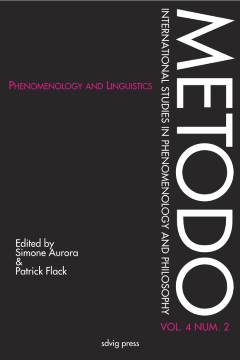Spatial phenomenology and cognitive linguistics
The case of bodily and perceptual spaces
pp. 159-212
Abstract
A recurrent assumption in linguistic theory is the semantically basic nature of spatial senses, particularly the kind of spatial relations expressed by grammatical function words like adpositions. It has been argued that such linguistic forms express meanings closely related to perceptual experience, but they also extend to non-spatial meanings through processes of abstraction. In this way, space can be seen as a mediating link between cognition and language. In this paper, we explore this privileged status of space by examining two different proposals for the basic character of space in language and experience, both emanating from various strands in cognitive linguistics: perceptual space and bodily space. We compare how these spaces have been spelled out with similar proposals from phenomenological philosophy. In phenomenology, perceptual and bodily space have been of focal interest due to their constitutive role for human experience. From this comparison, we argue that there are clear connections between pre-linguistic capacities like visual perception and language, but in order to be viable proposals these connections need to be aware of the differences between meaning in language and in perception. Furthermore, while sympathetic to the view that space is experientially foundational, we stress that space is at the same time conceptually polysemous and open to cultural-specific meaning ascriptions. We show that parsing out the variations of space and analyzing the constitutive links between them is required for differentiating the various notions of space that have been proposed as basic, but nevertheless collocated under a general and vague concept of space. Following in the veins of the spatial turn, we show that the heterogeneity of space can be thought as invoking a plural conception of space. Moreover, we argue that the idea of heterogeneity of space can be accommodated introducing the concept of n-spaces.
Publication details
Published in:
Aurora Simone, Flack Patrick (2016) Phenomenology and linguistics. Metodo 4 (2).
Pages: 159-212
Full citation:
Blomberg Johan, Thiering Martin (2016) „Spatial phenomenology and cognitive linguistics: The case of bodily and perceptual spaces“. Metodo 4 (2), 159–212.


